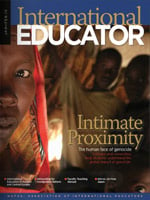The following appeared in the January/February issue of International Educator magazine.
 One of NAFSA's new board members, Simon Adams, executive director of the Global Centre for the Responsibility to Protect, wrote an op-ed for the New York Times last month about the world's next genocide. He noted that according to former Ambassador Peter W. Galbraith, the world's next genocide is likely to be in Syria. Genocides have haunted us as global citizens for centuries, but since World War II the study of genocide has become a larger part of higher education, and faculty and students learn about the issues that cause genocide in hope of preventing them in the future.
One of NAFSA's new board members, Simon Adams, executive director of the Global Centre for the Responsibility to Protect, wrote an op-ed for the New York Times last month about the world's next genocide. He noted that according to former Ambassador Peter W. Galbraith, the world's next genocide is likely to be in Syria. Genocides have haunted us as global citizens for centuries, but since World War II the study of genocide has become a larger part of higher education, and faculty and students learn about the issues that cause genocide in hope of preventing them in the future.
Often studying something as horrific as genocide is not easy, and it takes leaving home to really investigate the cause of genocide in a specific region. Umit Kurt left his native Turkey to come to a doctoral program in the United States to study the Armenian genocide because there was no scholar in his native land conducting research.
As international educators and citizens of the world, it is our duty to learn as much as we can about issues affecting our world—even if they are atrocious events like genocide. With knowledge of the issues, we can hopefully, collectively as a citizenry, keep our eyes and ears open to signs that point toward the unthinkable happening and stop it before it gets out of hand. Learning about these issues can be a turning point toward helping the cause in the future. Ellen Kennedy, adjunct professor at William Mitchell Law School, met a Rwandan woman who was a victim of genocide in 2005. She was so inspired by this woman's story that she founded a World Without Genocide in 2006 at the William Mitchell College of Law in St. Paul, Minnesota, with a group of students. The organization has grown tremendously to educate others through classes, workshops, films, exhibits, and conferences in addition to advocating successfully for city and state legislation. But knowledge is only one piece of the puzzle.
"Knowledge is not power; knowledge plus action equals power," Kennedy says. "We have the power as ordinary citizens to truly make a difference and to envision and create a world without genocide."
The cover story of the latest issue of International Educator magazine, "Intimate Proximity: The Human Face of Genocide," by Dana Wilkie investigates what faculty and students are doing to learn about genocide, help its victims, and influence others that will hopefully help put an end to genocide one day.
